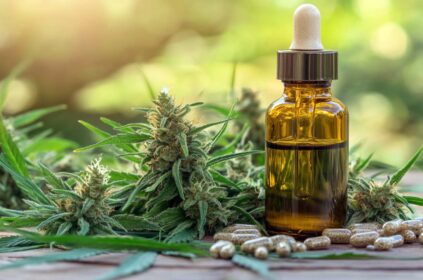Introduction to CBD and Post-Operative Pain Management
In today’s evolving landscape of medicine, the quest for effective and safe pain management strategies, particularly in the aftermath of surgery, has led to growing interest in cannabidiol (CBD). Unlike its more famous cousin, tetrahydrocannabinol (THC), CBD is a non-psychoactive compound derived from the cannabis plant. This characteristic alone has made it appealing for those seeking pain relief without the high commonly associated with cannabis. This guide explores the benefits, uses, and emerging research surrounding CBD’s role in post-operative pain management and inflammation.
How CBD Works for Pain Relief
CBD interacts with the endocannabinoid system (ECS) in our bodies, a complex cell-signaling system thought to play a critical role in regulating various physiological processes, including pain perception, immune responses, and even mood. Unlike THC, CBD doesn’t bind directly to the main cannabinoid receptors in the brain, enabling it to exert its effects without inducing a high.
Mechanism of Action
- Modulating Endocannabinoids: CBD helps modulate the activity of endocannabinoids—natural compounds that our bodies produce. By influencing these molecules, CBD can effectively reduce pain and inflammation.
- Influencing Pain Pathways: Research indicates that CBD interacts with the pain pathways in the brain and spinal cord. This action can alter the brain’s perception of pain, contributing to its therapeutic potential, especially in managing discomfort following surgical procedures.
Clinical Studies on CBD for Post-Operative Pain
A burgeoning number of clinical studies are shedding light on the efficacy of CBD for post-operative pain management.
Rotator Cuff Surgery
For instance, a significant study published in The American Journal of Sports Medicine at NYU Langone Health examined the effects of CBD on patients recovering from arthroscopic rotator cuff repair. Patients who received 50 mg of CBD reported markedly lower pain levels and expressed higher satisfaction regarding pain management when compared to those receiving lower doses or a placebo. This finding underscores CBD’s potential role in enhancing recovery experiences for surgical patients.
Safety and Efficacy
A critical advantage highlighted in the same study is that CBD, when administered orally in controlled doses, typically does not produce the adverse side effects associated with conventional pain relievers like opioids or non-steroidal anti-inflammatory drugs (NSAIDs). Many participants reported no serious side effects such as nausea, anxiety, or liver damage, marking CBD as a promising alternative for alleviating post-operative discomfort.
Benefits of Using CBD for Post-Operative Pain
Reduced Opioid Use
A significant concern in pain management today is the over-prescription of opioids, which carries a risk of addiction and misuse. Research suggests that CBD could substantially reduce the need for these powerful medications. In fact, studies indicate that nearly 30% of individuals prescribed opioids following surgery may experience misuse or dependency, highlighting the importance of alternative solutions like CBD.
Anti-Inflammatory Effects
Beyond pain relief, CBD is recognized for its robust anti-inflammatory properties. These effects can help mitigate the inflammatory responses that occur following surgery, potentially leading to quicker recovery times and less discomfort in patients.
Multimodal Pain Management
CBD can also be effectively integrated into a multimodal pain management strategy, which combines different therapeutic approaches for enhanced efficacy. By incorporating CBD alongside traditional painkillers, patients may benefit from improved overall pain management while minimizing the risks associated with higher doses of individual medications.
Practical Considerations for Using CBD
Dosage and Administration
Determining the appropriate dosage is crucial. Current studies suggest that higher doses, such as 50 mg of CBD, might be more effective in improving pain relief and patient satisfaction. However, it’s essential that patients adhere to clinical studies’ recommendations instead of relying on unregulated commercial CBD products, which can vary significantly in quality and strength.
Quality and Source
Given the vast array of CBD products available today, selecting a high-quality source is paramount. Look for products that are:
- Manufactured in facilities adhering to strict quality control standards.
- Tested for purity and potency to ensure safety and efficacy.
It’s equally important to involve healthcare providers in discussions about starting any CBD regimen, as they can offer valuable insights tailored to individual needs.
Future Research and Implications
While early evidence points to CBD as a beneficial aid in post-operative pain management, ongoing research is essential to fully elucidate its role. Future studies are investigating not only the effectiveness of CBD for various types of pain but also its potential synergistic effects when combined with other analgesics.
Conclusion
CBD appears to hold significant promise as a viable option for managing post-operative pain and inflammation. Its potential to reduce opioid dependence, deliver anti-inflammatory benefits, and work within multimodal strategies makes it an exciting area of research within pain management. As the scientific community continues to explore and validate CBD’s capabilities, both healthcare providers and patients can benefit from remaining well-informed about this innovative therapeutic option.
Actionable Tips
- Consult Healthcare Providers: Always consult with a healthcare professional before initiating any CBD regimen to ensure its safety and relevance to your specific circumstances.
- Choose High-Quality Products: Seek out trusted sources and check for products that have been rigorously tested for their quality.
- Follow Clinical Guidelines: Adhere to recommended dosages and methods of administration based on clinical research findings to maximize safety and effectiveness.
By considering CBD as part of post-operative pain management strategies, patients may not only improve their pain control but also support a healthier recovery journey, reinforcing the potential for CBD to transform pain relief in surgical care.
In closing, as the research into CBD and its benefits evolves, so too does the opportunity to enhance patient care. Staying informed about these developments is essential for anyone interested in exploring this pathway toward effective pain management.





















